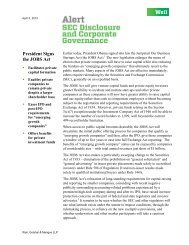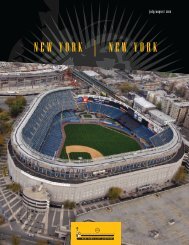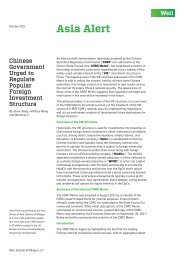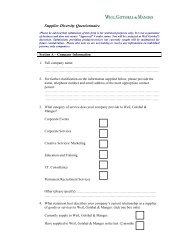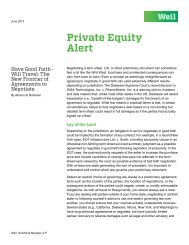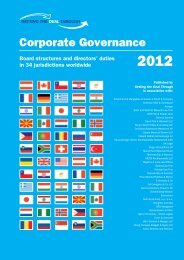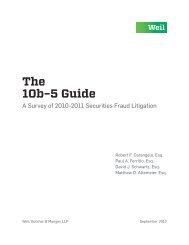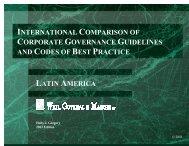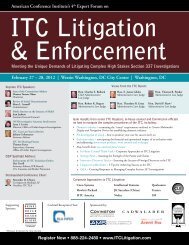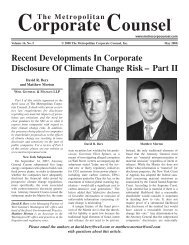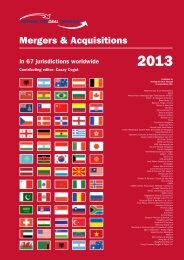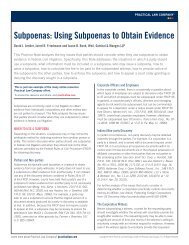Download PDF - Weil, Gotshal & Manges
Download PDF - Weil, Gotshal & Manges
Download PDF - Weil, Gotshal & Manges
You also want an ePaper? Increase the reach of your titles
YUMPU automatically turns print PDFs into web optimized ePapers that Google loves.
OTHER BOARD COMMITTEE REQUIREMENTS<br />
STATUTORY / REGULATORY REQUIREMENTS<br />
Board Committee Approval of Certain Swap Transactions. Sections 723(b) and 763(a) of<br />
the Dodd-Frank Act require an “appropriate committee” of any public company filing SEC<br />
reports that engages in derivatives activities to review and approve the decision to enter into<br />
covered “swap transactions” that rely on the so-called “commercial end-user” exemptions<br />
from (1) new Exchange Act requirements to clear a security-based swap or execute a securitybased<br />
swap through a national securities exchange and (2) new Commodity Exchange Act<br />
requirements to clear and execute a swap through a board of trade or swap execution facility.<br />
These requirements became effective on July 21, 2010; however, final determinations<br />
regarding reliance on the Commodity Futures Trading Commission rule implementing the enduser<br />
exemption for swaps, 150 and/or the corresponding rule for security-based swaps proposed<br />
(but not yet adopted) by the SEC, 151 will not be required until at least September 2013<br />
(assuming the company is not a “financial entity”). 152<br />
Mandatory Risk Committees for Certain Financial Companies. Section 165 of the Dodd-<br />
Frank Act requires the following entities to establish a risk committee responsible for the<br />
oversight of enterprise-wide risk management practices:<br />
(a) publicly traded “nonbank financial companies supervised by the Federal Reserve<br />
Board of Governors;”<br />
(b) publicly traded bank holding companies with total consolidated assets of $10 billion<br />
or more; and<br />
(c) publicly traded bank holding companies with total consolidated assets of less than<br />
$10 billion where the Federal Reserve Board of Governors has determined that establishment<br />
of a risk committee is necessary or appropriate to promote sound risk management.<br />
“Nonbank financial company supervised by the Federal Reserve Board of Governors” is<br />
defined to mean a company that is substantially engaged in financial activities in the U.S.<br />
where it has been determined by the Financial Stability Oversight Council that material<br />
financial distress at the company would pose a threat to the financial stability of the U.S.<br />
(other than bank holding companies or their subsidiaries). Section 165 of the Dodd-Frank Act<br />
required the Federal Reserve Board of Governors to issue regulations by July 21, 2012,<br />
requiring these companies to establish risk committees; such regulations were to take effect by<br />
October 21, 2012. 153 On January 5, 2012, the Federal Reserve Board of Governors proposed<br />
rules that would implement the risk committee requirements, however, as of the date of this<br />
report, the Federal Reserve Board of Governors has not adopted final rules. Section 165<br />
provides that each risk committee must include such number of “independent directors” as the<br />
Federal Reserve Board of Governors deems appropriate. The Federal Reserve Board of<br />
Governors proposes to refer to the definition of “independent director” in Regulation S-K for<br />
companies that are publicly traded in the United States.<br />
The Federal Reserve Board’s proposed rules would require risk committees to be chaired by an<br />
independent director and have as a member at least one “risk management expert,” which is<br />
defined to mean a person having experience in identifying, assessing and managing risk<br />
exposures of large, complex firms.<br />
<strong>Weil</strong>, <strong>Gotshal</strong> & <strong>Manges</strong> LLP 33<br />
US_ACTIVE:\44182171\7\99980.0865



